A practical guide for Disability Support Workers, family, friends and for people organising events.
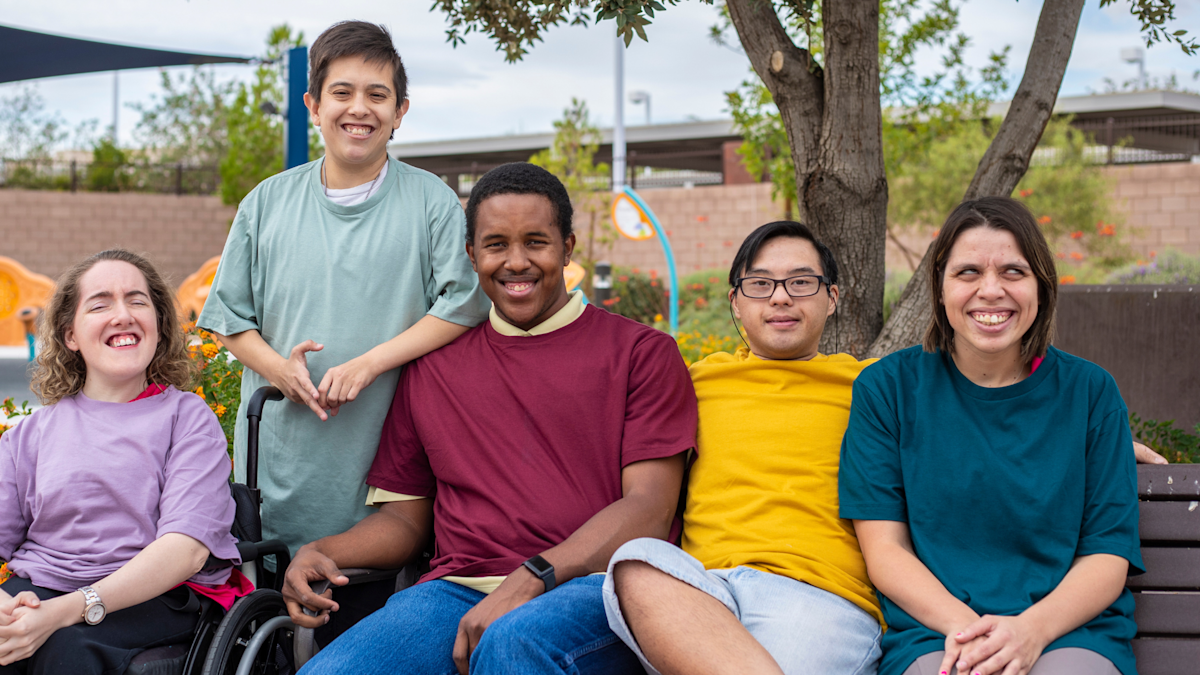
Image: Five people with different physical and intellectual disability are sitting on a park bench. They are wearing different coloured bright t-shirts and smiling at the camera.
Attending events, whether it's a community discussion, an online webinar, or a fun social activity is exciting, empowering, and enriching. But for people with intellectual disabilities, these events can also be unfamiliar, overwhelming, or filled with hidden barriers.
As a support worker or family member, with preparation and person-centred approaches, you can help someone feel safe and confident to participate in ways that are meaningful for them.
This guide walks you through practical strategies to support someone with an intellectual disability before, during, and after different types of events.
Putting the individual first
Before any event is chosen, it’s important to understand the person you’re supporting. Your support needs to reflect the person’s communication style, sensory needs, anxiety triggers, and preferences.
Take time to talk with the person you are supporting about:
What kinds of events they’ve enjoyed (or not enjoyed) in the past.
Whether they’re comfortable in group settings or prefer smaller environments.
What supports they might need; like extra time to process information, visual aids, or breaks.
If you are a support worker, it can be helpful to speak with family members, friends, or other support staff who know the person well, especially if this is one of their first times attending an event.
Preparing for the event
In-person events: discussions, workshops and social meetups
Preparation is one of the most important factors in making in-person events enjoyable. Start by helping the person understand the event using plain language or visual resources. A social story, easy read or picture-based schedule can be helpful for explaining where the event is, who will be there, what will happen, and what the person can do if they feel unsure or need support.
Many events allow attendees to include their accessibility needs when registering. Support the person to think about what would help them participate comfortably. This might include things like wheelchair access, Auslan interpretation, or quiet spaces. If they’re unsure, talk through some examples together. You can support them to fill out the registration form or to contact the event organisers directly.
If possible, visit the venue ahead of time. This can reduce anxiety and help the person become familiar with the space—such as where to enter, where the bathrooms are, and where they can take a break if they feel overwhelmed.
You might also rehearse common interactions or role-play scenarios: introducing themselves, asking a question, or saying they’d like a break. Giving the person tools and language in advance helps them feel more confident when the time comes.
The annual Having A Say Conference, run by VALiD, is a great event to go to!
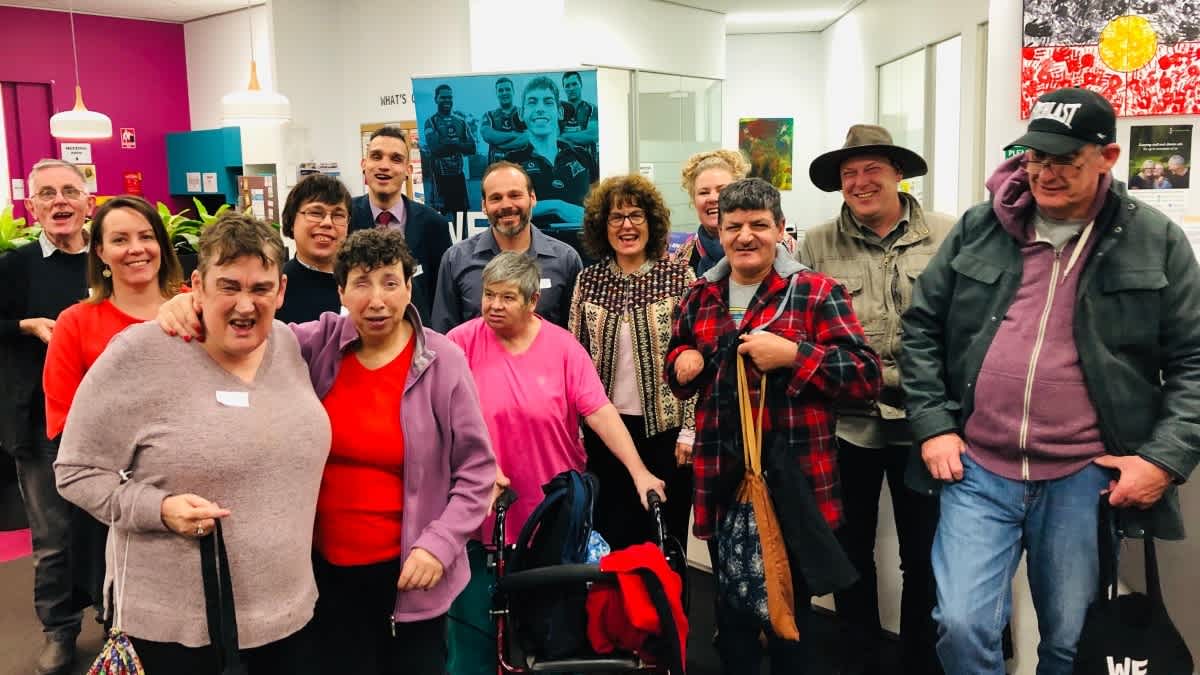
Image: NDIS participants at our first self-advocacy meeting.
Online events: webinars, forums or virtual classes
Online events come with their own set of challenges; technology, attention span, and unfamiliar formats, but with the right setup, they can be very accessible.
Start by helping the person get familiar with the platform. Practice logging in, adjusting the camera, muting/unmuting, and using chat or reaction buttons. Doing a 'tech run' the day before or earlier in the day helps avoid last-minute stress.
Make the environment comfortable and distraction-free. Sit with the person if needed, especially during the first few sessions, and be ready to support with any technical issues. Provide written or visual summaries of key information, and support the person to ask questions or share thoughts in whatever way works for them whether that is verbally, in the chat, or with visual cues.
The Disability Dialogue is running monthly online events designed and led by people with disability which you can join.
Supporting participation during the event
Once at the event, your focus should be on supporting meaningful participation while respecting the person’s autonomy.
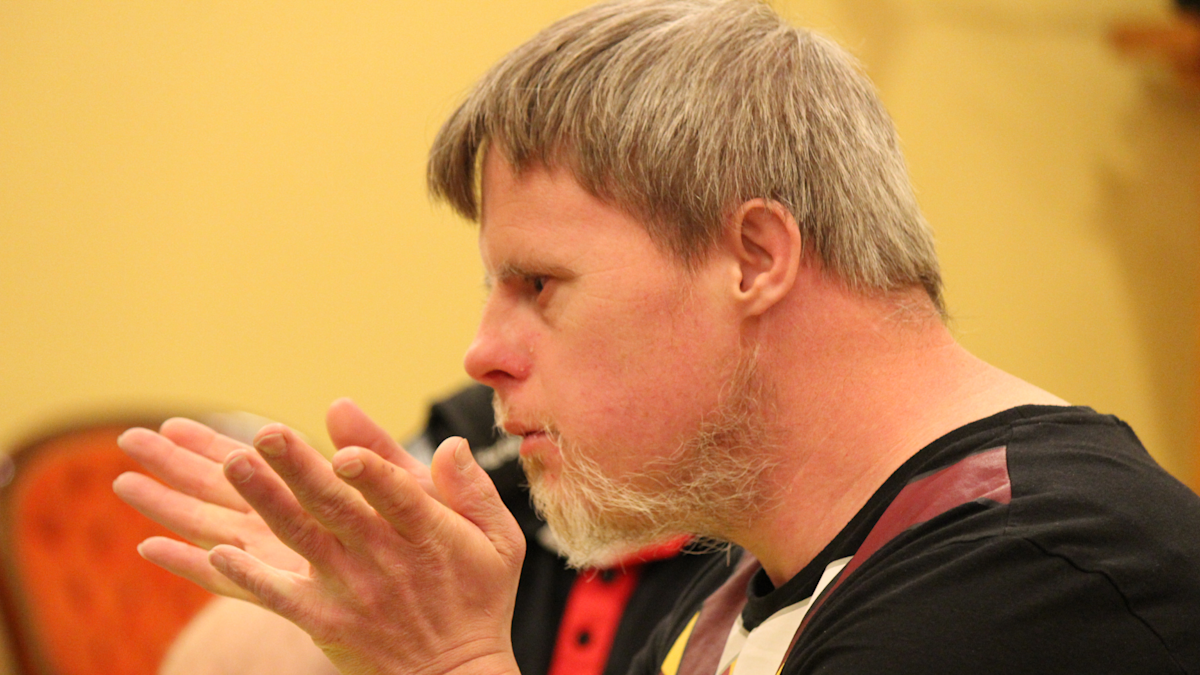
Image: A close-up of a participant talking.
At in-person events
If possible, arrive early to give the person time to settle in. Introduce them to the host or facilitator if appropriate. Stay nearby, but be mindful not to take over or speak on their behalf unless necessary. If the person wants to contribute but feels unsure, you might prompt them with reminders of what you practiced or offer to support their input (e.g., helping them read from notes).
Keep an eye out for signs of discomfort, confusion, or sensory overload. Offer regular check-ins or a pre-agreed signal the person can use if they need a break or want to leave early.
At Online Events
During the session, support the person to stay engaged. You might take short notes together, provide real-time clarification, or encourage participation through the platform’s features like reactions, chat, or emojis. Some people may prefer to just listen at first, and that’s perfectly okay. Observing can be a valuable form of engagement, especially in unfamiliar settings.
If the session includes breakout groups or interactive components, help the person prepare ahead of time, or stay on screen with them if appropriate. Support their participation, but let their voice and preferences lead.

Image: Three people looking at the camera taking a selfie, they are all smiling.
Support at fun and social events
Events like BBQs, trivia nights, concert, festivals and markets are just as important as educational or advocacy-focused events. They offer social connection, community belonging, and relaxation.
However, many of the same supports still apply. Start by finding out what aspects of the event appeal to the person. Are they excited about the music? The food? The chance to meet new people? Helping them connect to what’s meaningful for them can reduce anxiety and increase motivation.
Talk through the event ahead of time and explore choices they can make such as what to wear, who to go with, what to bring. Support the person to express their preferences and prepare for any sensory or social challenges.
At the event, be mindful of pacing. Fun events can still be overwhelming. Have a plan in place for taking breaks or stepping away if needed. If the person becomes anxious or overstimulated, validate their feelings and offer options without pressure.
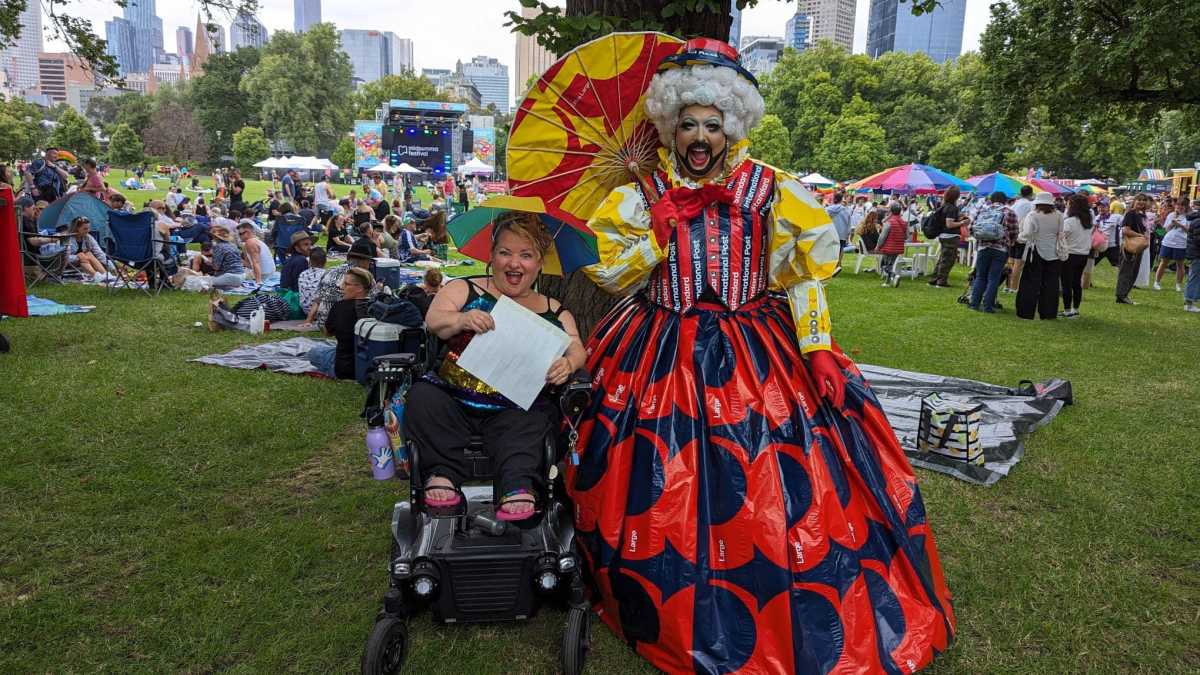
Image: Caroline Bowditch is sitting in a wheelchair under a tree. To her right is a person dressed in drag.
Check in afterwards
Regrouping after the event is a vital part of the process. Talk about how it went in a calm, familiar environment. You might use visual supports, photos from the event, or simple check-ins like thumbs up/thumbs down to guide the conversation.
Focus on what went well. Celebrate any steps taken whether it was joining the session, staying for part of it, saying hello to someone new, or simply showing up. All of these are important and worth recognising.
Ask the person what they’d like to do differently next time and write down any helpful tactics for future use. Building a personalised participation plan over time helps increase confidence and independence for everyone.
Supporting someone with an intellectual disability to engage in is about much more than logistics. It’s about building trust, promoting autonomy, and creating environments where people can truly belong.
There is no one-size-fits-all approach. The key is preparation, flexibility, and a willingness to adapt your support to what the individual needs, not just what the event offers.
When in doubt, focus on the person. Their comfort, their choice, and their voice should always be at the centre of your support.
Using accessible technology to enhance participation
Technology can play a powerful role in breaking down barriers for people with intellectual disability. Tools like text-to-speech, speech-to-text, and visual communication apps can help people process and communicate more effectively in real time.
For example, a person may use text-to-voice software to type out a comment or question they want to read aloud during a webinar, or AI-powered summarisers to break down long pieces of text into simpler language before the event. Apps or built-in accessibility features on smartphones and tablets can also provide visual, auditory, or simplified support that makes participation easier and more independent.
As a support worker, it's valuable to explore these tools alongside the person you support, offering training and practice in low-pressure settings. The right technology, when matched to the individual’s needs and preferences, can significantly increase confidence, understanding, and active participation.
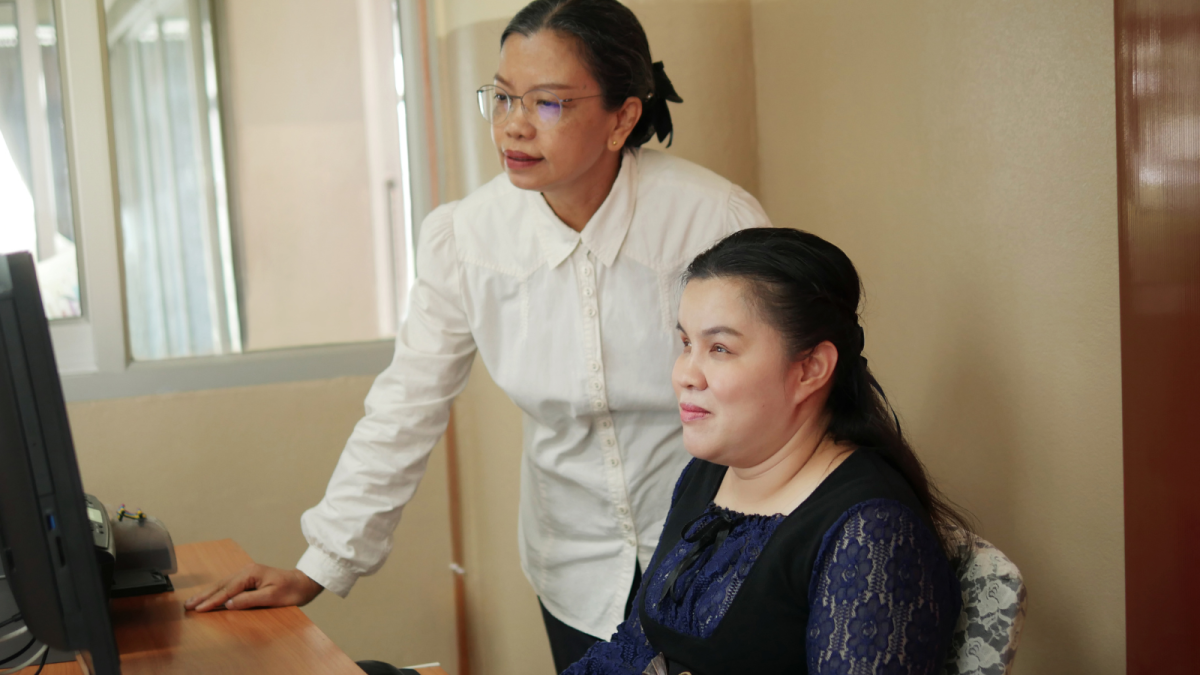
Image: Two women are at a desk looking at a computer. A woman in a white shirt is standing and a woman in a dark shirt is sitting. The woman in the dark shirt has a vision impairment and is using a screen reader.
From conferences and concerts to festivals and workshops, events serve as vital platforms for collaboration, learning, and community engagement. Read how to make any event a more inclusive one.
By ensuring events are accessible and adopting an inclusive approach, we can ensure more people with disability feel welcomed at events, building a more compassionate and inclusive society where everyone feels valued and empowered.
For further education, we suggest visiting:


